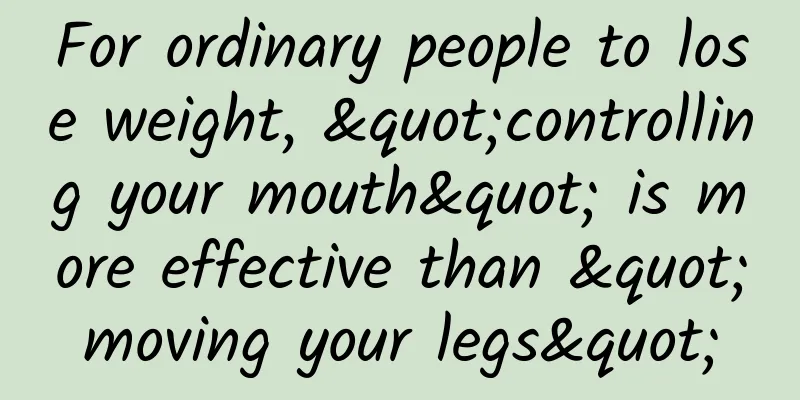For ordinary people to lose weight, "controlling your mouth" is more effective than "moving your legs"

|
Chen Wei May 11 is World Obesity Day. Obesity can seriously affect physical health, so it is imperative to understand obesity scientifically and reduce the burden on health. Losing weight has become the main theme for many people year after year. However, many people have put in sweat and effort but have not succeeded in losing weight, and even run counter to their health. How to overcome the "pitfalls" on the road to weight loss? What are the scientific weight loss methods? You won't lose weight if you don't eat dinner Many people start their weight loss journey by skipping dinner. First of all, it should be clear that skipping dinner will not help you lose weight! Unless you can skip dinner for the rest of your life, if it is just a short-term behavior, once you start eating dinner again, your weight will definitely rebound. If you skip dinner, your hungry cells will frantically absorb energy from the next day's breakfast, and the result is starvation. It is recommended that people who are losing weight should consume about half an ounce to one ounce of refined carbohydrates for dinner, while ensuring adequate intake of high-quality protein. They can eat one to two ounces of pure lean meat and about half a pound of vegetables. This is an ideal dinner intake. In addition, it is recommended to finish eating around 6 pm. Long-term weight loss "energy restriction" To achieve a long-term ideal weight, we must first pay attention to balance, science, and rationality. The seven major categories of nutrients, including carbohydrates, lipids, proteins, vitamins, minerals, water, and dietary fiber, are all necessary for the human body. Lack of any one of them will cause malnutrition. A "limited energy balanced diet" method is recommended. On the basis of daily meals, an average reduction of 1/3 can achieve weight loss. You don't need to change anything, just change the amount of food. This is the simplest way in the long run. In addition, the calories burned by running 10 kilometers are roughly equivalent to the calories burned by a hamburger. For ordinary people, "controlling your mouth" is more efficient than "moving your legs"; the value of exercise is to mobilize the fat in the body. Without the coordination of exercise, weight loss is impossible to succeed. Short-term weight loss "light fasting" For those who need to lose weight in the short term, you can adopt the high-protein method, that is, increase the protein energy supply ratio in the short term, so that the overall protein energy supply accounts for more than 30%, and implement it for 2-3 weeks in the short term to lose the desired weight. In addition, you can also try the short-term "5+2" light fasting method, eat normally for 5 days, and light fast for 2 non-consecutive days, combined with basic physical exercise, you can achieve the effect of short-term rapid weight loss. On non-fasting days, properly control calorie intake. The recommended total calorie intake for women is 1200-1500 kcal/day, and for men it is 1500-1800 kcal/day. You can lose about 2-3 kg in a month. Weight loss plateaus don’t really exist In the early stages of weight loss, you usually only need to increase exercise or reduce food intake to lose weight. When the body adapts to this change, it will adapt, making full use of the calories consumed and reducing calorie consumption. Weight does not change for 1 week to 2 months. This is the so-called "plateau period." From a methodological perspective, there is indeed a certain plateau period, but it is not that long. Generally speaking, a "plateau period" occurs 4-6 months after a method is implemented, because the body needs a process of adaptation to each method. Once adapted, it may really reach a "plateau period." In short, first, you need to be able to combine various nutrients to ensure adequate and balanced nutrition and achieve the goal of limiting total energy intake; second, you need to eat in a scientific way, such as using cooking methods that reduce oil, salt, and sugar, and eating slowly, etc. This is the part that is most easily overlooked. You have to know how much you eat at every meal every day, and then consume it, so that you can smoothly pass the "plateau period". Therefore, the real plateau period does not exist. What exists is the degree of seriousness and effort in everyone's mind about weight loss. (The author is deputy director of the Nutrition Department of Peking Union Medical College Hospital) |
<<: Kiel University in Germany develops blood test method for early diagnosis of Parkinson's disease
Recommend
Why do you get stretch marks during pregnancy?
Although women are born with a maternal glow and ...
I got pregnant after 4 dominant follicles were released.
Generally, before pregnancy, pregnant women will ...
How to connect two repetitions of Ba Duan Jin? How many times should I do each movement of Ba Duan Jin?
Ba Duan Jin is a colorful treasure among traditio...
Drink a cup of it before meals to control disease and lower blood sugar
Recently, a study published in the British Medica...
Is it better to make the dough for pancakes harder or softer? What are the tips for making the dough for pancakes?
As we all know, pancakes are a common type of pas...
What causes vertigo in women?
If many female friends always feel that they have...
You can’t miss these useful facts about liver cancer!
Liver cancer is a serious cancer that is often di...
Correctly understand the "wealth bag"
In daily life, we often see people with a big bag...
How to check the quality of eggs?
The quality of eggs and sperm can directly affect...
What are the recommended tourist attractions in Tibet? What are the New Year customs in Tibet?
There are many customs for New Year's Day. In...
What are the symptoms of menopause in women
Menopause is a special stage in women's lives...
What is the cause of acne before and after menstruation?
Everyone thinks that acne is exclusive to adolesc...
Woman feels dizzy, nauseous, and short of breath
If you feel palpitations, chest tightness, dizzin...
Why is vaginal discharge red and black?
Leucorrhea is a sticky white fluid that flows out...
Withdrawal bleeding after emergency contraceptive pills
It is normal for married couples to have sexual i...









